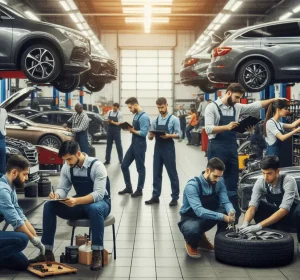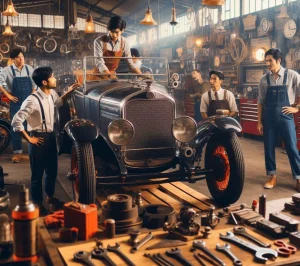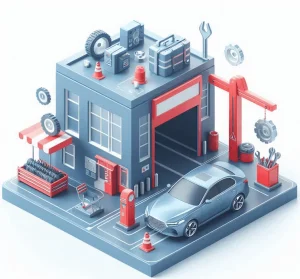Table of Contents
Used Car Purchasing a Used Car can be an exciting yet daunting experience. With the right approach, you can drive away with a vehicle that meets your needs without breaking the bank. Here are some comprehensive tips to help you get the most out of your Used Car purchase, ensuring you make a wise investment that keeps you happy and your wallet intact.

1. Do Your Homework
Research the Market
Before setting foot on a dealership lot or contacting a private seller, immerse yourself in research. Understanding the market value of different Used Car models is crucial. Websites like Kelley Blue Book, Edmunds, and NADA Guides provide accurate pricing information based on the car’s make, model, year, and condition.
Know What You Want
Make a list of your must-have features and specifications. Whether it’s fuel efficiency, safety ratings, or tech features, knowing what you want will streamline your search and prevent you from getting overwhelmed by options.
2. Budget Wisely
Set a Realistic Budget
Determine how much you can afford to spend on your Used Car, including taxes, registration fees, insurance, and potential maintenance costs. Stick to this budget to avoid financial strain.
Consider Financing Options
If you’re not paying cash, explore financing options. Compare interest rates and terms from various lenders to find the best deal. Pre-approval from a bank or credit union can give you a clearer picture of your purchasing power.
3. Shop Around
Dealerships vs. Private Sellers
Both dealerships and private sellers have their pros and cons. Dealerships often provide warranties and certified pre-owned options, while private sellers might offer lower prices and more room for negotiation. Weigh these factors based on your priorities.
Certified Pre-Owned Vehicles
Certified Pre-Owned (CPO) vehicles have been inspected and refurbished by the manufacturer or dealer and come with an extended warranty. This can provide peace of mind and added value, especially if you’re concerned about reliability.
4. Inspect the Car Thoroughly
Exterior and Interior Inspection
A meticulous inspection can reveal a lot about the condition of a Used Car. Look for signs of rust, dents, and mismatched paint on the exterior. Inside, check for wear and tear on the seats, dashboard, and carpeting. Ensure all electronics, such as the infotainment system, lights, and windows, are functioning correctly.
Under the Hood
Inspect the engine for leaks, corrosion, and worn belts or hoses. Check the oil and transmission fluid levels and condition. A clean, well-maintained engine compartment can be a good indicator of the car’s overall health.
Test Drive
Never skip the test drive. Pay attention to how the car handles, brakes, and accelerates. Listen for unusual noises and assess the comfort of the ride. A test drive is your opportunity to experience the car in real-world conditions.
5. Review the Vehicle History Report
Obtain a Comprehensive Report
Services like Carfax and AutoCheck provide detailed vehicle history reports, including information on previous ownership, accident history, title status, and service records. This report can help you avoid vehicles with hidden issues.
Verify the VIN
Ensure the Vehicle Identification Number (VIN) on the report matches the car’s VIN. Check for any discrepancies or red flags that might indicate odometer fraud or title issues.
6. Negotiate Like a Pro
Be Prepared
Armed with your research and inspection findings, you’re in a strong position to negotiate. Know the market value and any potential issues with the car to justify your offer.
Stay Firm but Fair
Negotiation is a give-and-take process. Be firm on your budget but also be willing to meet the seller halfway if the car meets your expectations. Being respectful and reasonable can lead to a mutually beneficial agreement.
7. Consider Additional Costs
Maintenance and Repairs
Budget for potential maintenance and repairs, especially if you’re buying an older Used Car. Regular maintenance like oil changes, brake pads, and tire replacements can add up, so it’s wise to set aside funds for these expenses.
Insurance Costs
Insurance premiums for Used Cars can vary significantly. Get quotes from multiple insurance providers to find the best rate. Consider factors like the car’s safety features, age, and your driving record.
8. Ensure Proper Documentation
Bill of Sale
The bill of sale is a legal document that records the transaction between you and the seller. It should include the purchase price, vehicle details, and signatures from both parties. This document is crucial for registration and proving ownership.
Title Transfer
Ensure the title is transferred correctly to your name. This process varies by state, so check with your local DMV for specific requirements. Make sure there are no liens on the title, which could complicate the transfer.
9. Take Advantage of Warranties and Return Policies
Dealer Warranties
If purchasing from a dealership, inquire about any warranties that come with the Used Car. A warranty can protect you from unexpected repair costs and provide added peace of mind.
Return Policies
Some dealers offer return policies, allowing you to return the car within a specific period if you’re not satisfied. Understand the terms and conditions of any return policy before finalizing your purchase.
10. Join Online Forums and Communities
Gain Insights from Other Owners
Online forums and communities for specific car brands and models can be valuable resources. Engage with other owners to learn about common issues, maintenance tips, and modifications. These insights can help you make an informed decision and keep your Used Car in top condition.
Share Your Experience
Once you’ve made your purchase, share your experience with others. Your feedback can help prospective buyers and foster a sense of community among fellow car enthusiasts.
11. Keep Up with Regular Maintenance
Follow the Maintenance Schedule
Adhering to the manufacturer’s maintenance schedule is key to keeping your Used Car running smoothly. Regular oil changes, tire rotations, and brake inspections can prevent major issues and extend the life of your vehicle.
Use Quality Parts and Services
Opt for high-quality replacement parts and trusted service providers. While it might be tempting to cut costs, investing in quality maintenance can save you money in the long run by avoiding frequent repairs.
12. Customize to Enhance Value
Personal Touches
Customizing your Used Car with personal touches like new seat covers, floor mats, or a fresh coat of paint can enhance its appeal and value. These upgrades can make your car feel new and uniquely yours.
Performance Upgrades
Consider performance upgrades such as better tires, suspension enhancements, or a new exhaust system. These modifications can improve your driving experience and potentially increase the car’s resale value.
13. Drive Responsibly
Practice Safe Driving
Driving responsibly not only ensures your safety but also helps maintain the condition of your Used Car. Avoid aggressive driving, overloading, and excessive speeds to reduce wear and tear on the vehicle.
Monitor Driving Habits
Keep an eye on your driving habits and their impact on fuel efficiency and vehicle health. Using apps or onboard systems to monitor your driving can help you make adjustments to improve performance and longevity.
14. Plan for Future Resale
Keep Detailed Records
Maintain detailed records of all maintenance and repairs. A well-documented service history can boost your car’s resale value and attract potential buyers.
Regular Cleaning and Care
Regularly cleaning and caring for your Used Car can keep it looking and functioning like new. Consistent upkeep can make a significant difference when it’s time to sell or trade in your vehicle.
Used Car
Getting the most out of your Used Car purchase involves careful planning, thorough research, and proactive maintenance. By following these tips, you can make a wise investment that provides reliability, satisfaction, and value. Whether you’re a first-time buyer or a seasoned car enthusiast, these strategies will help you navigate the world of Used Cars with confidence and achieve the best possible outcome. Enjoy your new ride and happy driving!





More Stories
Why Enclosed Car Shipping is Essential for Your High-Value Vehicle
The Ultimate Guide to Choosing the Perfect Helmet for Men
Cash for Cars: The Smart Way to Sell Your Junk Car in Dallas, TX